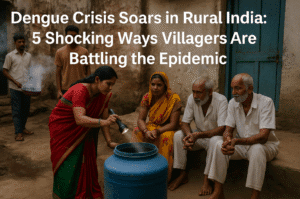Dengue Crisis Soars in Rural India: 5 Shocking Ways Villagers Are Battling the Epidemic
In Pune’s Karanjawane village, climate change fuels a dengue crisis as erratic monsoons and droughts create ideal breeding grounds for disease-carrying mosquitoes. Health workers, led by ASHA volunteers, wage a grassroots war—educating residents on identifying larvae, safe water storage, and breaking stigmas around treatment. Despite resource shortages, including limited diagnostic kits, the community’s frontline defense hinges on prevention and trust-building.
A 2025 Nature study warns of a 13% rise in dengue deaths here by 2040, with marginalized groups like migrants in informal settlements bearing the brunt. While vaccine trials offer hope, experts stress that tackling climate-linked outbreaks demands more than medicine: clean water access, early warning systems, and equitable health policies are critical. Karanjawane’s story mirrors a global truth—fighting vector-borne diseases now requires bridging ecology, equity, and community resilience.

Dengue Crisis Soars in Rural India: 5 Shocking Ways Villagers Are Battling the Epidemic
Nestled in Maharashtra’s Pune district, the village of Karanjawane has become an unexpected frontline in India’s struggle against dengue. As climate change reshapes monsoons and intensifies droughts, this community faces a dual threat: scarce water forces residents to stockpile supplies, creating breeding grounds for Aedes mosquitoes, while erratic rains leave stagnant pools that further fuel outbreaks. With dengue cases soaring nationwide—surpassing 230,000 in 2024—Karanjawane’s story reveals the human cost of a warming planet and the resilience of those fighting to curb the crisis.
Climate’s Deadly Fingerprint
A landmark 2025 study in Nature underscores the grim link between climate change and dengue’s spread. Pune, identified as a hotspot, could see dengue-related deaths climb by 13% by 2040 and up to 112% by 2100. Rising temperatures extend mosquito breeding seasons, while unpredictable monsoons disrupt traditional prevention strategies. “Droughts force us to store water, but rains leave puddles for days. Mosquitoes thrive either way,” explains Srikanth Darwatkar, a local health advocate.
The ASHA Warriors
At the heart of Karanjawane’s defense are Accredited Social Health Activists (ASHAs), like Manisha Ratan Nidhalkar, who patrol villages armed with torches and larvicide. Their mission: educate households on spotting mosquito larvae and safe water storage. “We show them larvae in their tanks, treat the water, and return weekly to check,” says Nidhalkar. These efforts hinge on trust—a slow-building process in communities wary of outsiders.
Yet challenges persist. The local Primary Health Centre (PHC) often runs short of rapid dengue tests, receiving just 100 annually. “Without timely diagnosis, severe cases slip through,” notes Dr. Aishwarya Natkar, the PHC’s Medical Officer. Patients sometimes avoid care due to stigma, believing dengue signals personal failure.
Migrants and Marginalization
Dengue’s burden falls heaviest on vulnerable groups, including migrants laboring in Pune’s construction sites and farms. Lacking legal status,V accines many settle in informal slums absent from city maps, missing out on health campaigns. “Outbreaks explode where poverty and neglect intersect,” says public health expert Dr. Abhay Shukla.
Innovation Amid Adversity
Despite limited resources, creativity blooms. The PHC team uses WhatsApp groups to alert villagers about weather shifts linked to dengue risk. Local teens, trained by ASHAs, conduct neighborhood “larval hunts.” Meanwhile, researchers push for AI-driven outbreak forecasts, though hurdles like data gaps and bureaucratic delays stall progress.
The Vaccine Hope
While India’s ICMR trials a quadrivalent dengue vaccine, health workers stress that jabs alone won’t suffice. “Vaccines must pair with clean water access and climate adaptation,” argues Darwatkar. For now, prevention remains key—a lesson Karanjawane takes to heart.
A Blueprint for Resilience
Karanjawane’s struggle mirrors a global reality: climate-driven diseases demand grassroots action. By blending traditional knowledge with scientific insights, communities can turn the tide. As ASHA worker Nidhalkar reflects, “Every child who recognizes a mosquito larva is a step toward victory.”
Dengue’s rise is a symptom of deeper ecological and societal fractures. Yet in India’s villages, the resolve of health workers and informed citizens lights a path forward—one where prevention and equity become the cornerstones of survival.
You must be logged in to post a comment.